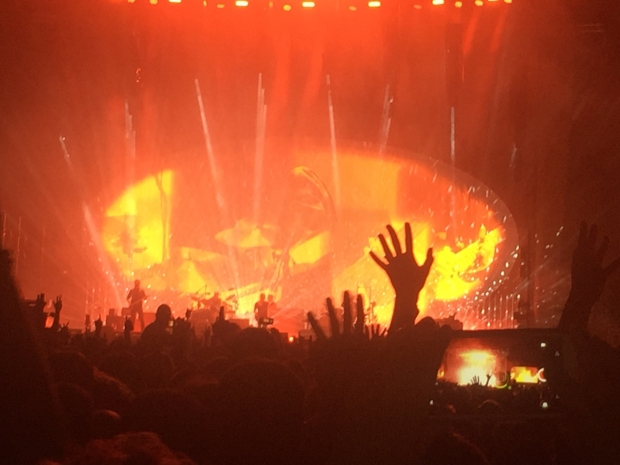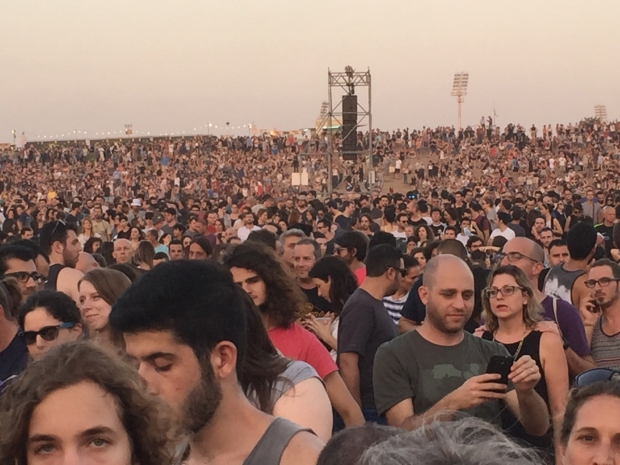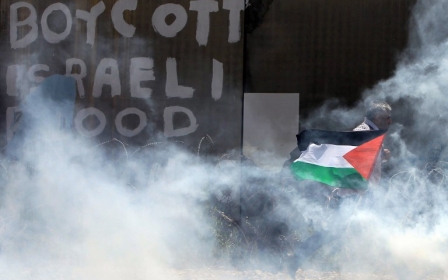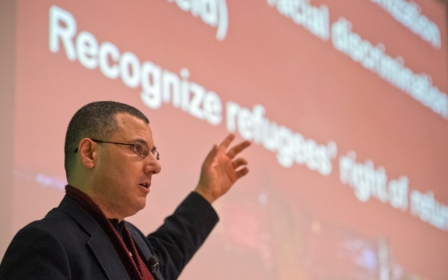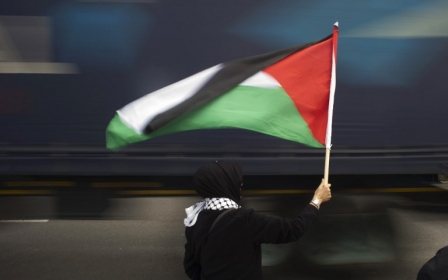Radiohead plays concert in Tel Aviv, snubs Palestinian boycott calls

TEL AVIV - Radiohead’s controversial performance in Israel went ahead as scheduled on Wednesday, with thousands pouring into Tel Aviv’s HaYarkon Park to watch the English rock group perform live.
“A lot of stuff was said about this, but in the end, we played some music,” said frontman Thom Yorke before the band finished its set.
This was Yorke’s only mention throughout the evening of the sharp criticism the group has received for its decision to play in Israel for the first time since Palestinians called for performers to boycott the country in 2005.
Radiohead has faced backlash from activists and world-renowned artists including Pink Floyd’s Roger Waters over its refusal to cancel the show despite pressure from the Boycott, Divestment, and Sanctions (BDS) movement.
Critics say such performances by international artists only work to legitimise Israel’s occupation of Palestinian land, many of them pointing out that the concert venue is built on the site of a Palestinian village that was depopulated during the Nakba of 1948.
“When you defy the call for the boycott, you are endorsing an apartheid regime which has oppressed Palestinians for decades,” said Huda Ammori, a UK-based BDS activist and signatory of a recent open letter to Radiohead.
“If artists and academics are sympathetic to the Palestinian cause, then they should respect their call for boycott,” she told MEE.
The rock group performed for nearly two and a half hours in the carnival-like summer atmosphere, with food stands, ferris wheels, and Tel Aviv’s skyscrapers in the distance.
Hebrew and occasionally English were spoken among the crowd, but scarcely a word of Arabic could be heard the entire evening, apart from Yorke’s lone cry of yallah - an Arabic word, often used in Hebrew, meaning “let’s go” - in between songs. Outside of the park, young Palestinian vendors sold water bottles and snacks.
Attendees blasted the campaign to pressure Radiohead to cancel the show.
“They can perform wherever they want - it isn’t supposed to be connected to politics,” said Saray, a young Israeli concert-goer, sitting in the grass outside the park before the show.
“I didn’t choose [Israeli Prime Minister Benjamin] Netanyahu - I hate him,” her friend Noy told MEE. “So why should you punish the people for his government?"
A third Israeli Radiohead fan, Betsalel, said he felt frustrated by some BDS proponents’ “lack of understanding of Israeli society,” but did not outright condemn the campaign.
“I can understand it. I think it’s a good aspiration. What’s happening here is f**** up and people noticing it is a good thing, not a bad thing.”
“I think it’s easy to say, ‘I want to see shows,’ but I don’t have a better solution, so everybody’s doing what he can. I don’t buy that it’s anti-Semitism - it’s not … Colonising in the 21st century is not possible anymore and if Israel still wants to remain a liberal country, a democracy like we are, and have the privilege to have Radiohead coming and stuff like that, then we’ll need to get over it.”
Cultural boycott
Moves for a cultural and academic boycott of Israel have often been met with the response that such actions end up targeting those in Israeli society most likely to be sympathetic to the Palestinian cause.
“I don't agree with the cultural ban at all, along with JK Rowling, Noam Chomsky and a long list of others,” Yorke said in a Rolling Stone interview in June.
Najwan Berekdar, an activist with BDS48, whose focus is on encouraging Palestinian citizens of Israel to join the movement, told MEE that the cultural boycott is meant as a “wake up” call to Israeli society.
“Let’s not forget that the Israeli society is a militarised society,” she said, referring to Israel’s mandatory military service.
“So basically, almost every individual in Israeli society has been part of the occupation, part of the system that has contributed to the occupation. … We don’t actually need people to identify with us. We need people to do something.”
“The boycott can come through economic pressure, or through cultural boycott, and some of the Israeli society will pay the price for that. Even though, of course, this price is nothing compared to the price the Palestinians pay on a daily basis even with their lives - not just with their houses and their rights,” Berekdar said.
While the BDS movement claims to represent the views of the vast majority of Palestinian society, outliers remain. One of them is singer Nasreen Qadri, a Palestinian citizen of Israel who won a televised Israeli singing competition and has sung at official Israeli holiday ceremonies. She performed with Radiohead on Wednesday.
Qadri rejected calls for a cultural boycott in an article in Newsweek on Wednesday, writing, “Such an approach is counter-productive and only hurting those who wish to promote peace and tolerance in a troubled region.”
Berekdar told MEE that Qadri's experience does not hold true for the vast majority of Palestinians.
“If one privileged woman was able to reach that progress, it does not say anything. It only says that Israel is trying to use normalisation projects in order to whitewash its image,” she said.
“One of the very old sayings that arose when the coexistence programmes started was, ‘You cannot coexist before you exist'.”
BDS successful?
Despite the fact that Radiohead went forward with the concert, BDS activists told MEE they felt the campaign has been successful in spreading the word about the boycott movement and the Palestinian cause in general.
“It has raised awareness of the cultural boycott to a new demographic of people, and has shown Palestinians that they will not be forgotten,” Ammori told MEE.
And Berekdar said that Yorke’s angry response to the campaign has tarnished Radiohead’s image.
In his Rolling Stone interview, Yorke criticised BDS activists, saying they were oversimplifying the situation.
“Just to throw the word ‘apartheid’ around and think that's enough,” he said. “It's f**** weird. It's such an extraordinary waste of energy.”
And during the group’s 8 July show in Glasgow, Yorke become frustrated by a group of protesters carrying flags and signs, and repeatedly said into the microphone, “Some f**** people,” and flashing his middle finger at the crowd.
“I think their unwillingness to cancel the show … has brought more media attention than any show that has been cancelled actually,” Berekdar said.
“And even their response and the language that they use has made them look more bigoted in the eyes of those who are reading about this. So I think that the effects will be that many more bands will think twice about performing in Israel.”
Marking its twelfth anniversary earlier this month, the BDS movement listed a number of recent victories on its website, including a UN report referring to “apartheid” in Israel, divestment votes passed by US churches, NFL football players turning down an all-expenses-paid PR trip to the country, and more.
New MEE newsletter: Jerusalem Dispatch
Sign up to get the latest insights and analysis on Israel-Palestine, alongside Turkey Unpacked and other MEE newsletters
Middle East Eye delivers independent and unrivalled coverage and analysis of the Middle East, North Africa and beyond. To learn more about republishing this content and the associated fees, please fill out this form. More about MEE can be found here.


